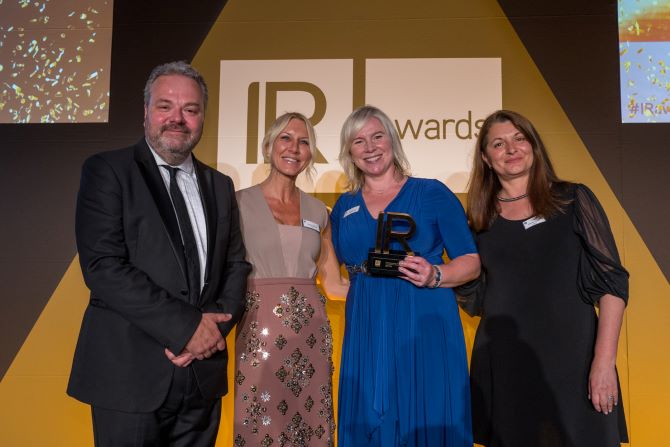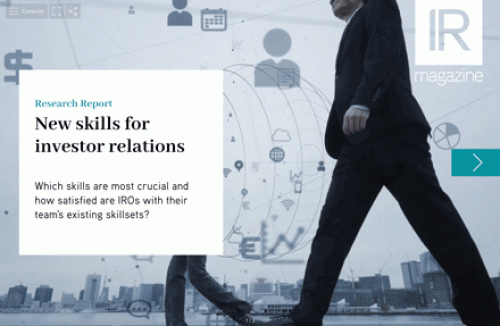IROs think AI and machine learning competence, sustainability reporting and sustainable finance knowledge will constitute the biggest gaps in their skillset over the next two years.
This is according to IR Magazine’s latest report on IR skills, based on the responses of 269 IR professionals across the world working at companies in different sectors. The report gathers data on which competencies are considered most critical, the key trends that are driving them and where IROs anticipate the gaps in their skillset will be widest in the near future.
Globally, 51 percent of respondents say AI and machine learning-related abilities will result in the biggest gap over the next two years. The second place goes to sustainability reporting, with 22 percent of respondents agreeing they will face challenges in this area given new ESG regimes, such as CSRD, coming into effect. The third-biggest gap is anticipated to be in sustainable finance knowledge, chosen by 20 percent of respondents globally.
Interestingly, the skills gap around the use of AI tools is the top area of concern across companies of all sizes, but especially at mid-cap firms, where nearly six in 10 IR practitioners are worried about their abilities to meet requirements.
Beyond that, even across different sectors, AI-related competence is where IR teams believe they are lacking mastery. So what can IROs do to close the skills gap in these areas?
‘On AI, I would suggest embracing it and learning about it. Have an understanding and keep up to speed with the developments of what it can do,’ advised Marina Calero when speaking on a panel at the IR Magazine Think Tank – Europe in June.

Calero, the former head of IR at Hyve and founder of the IR Coffee Breaks network, argued that while IROs are not expected to be coders or programmers, they need to have a general understanding of what AI tools are capable of, so they can pick and choose where those tools can support their day-to-day tasks.
‘To achieve [that understanding], make use of your network, make new connections and talk to them,’ she said at the think tank. ‘Large-cap companies, for example, are investing heavily in AI and there’s nothing stopping mid and small-cap companies from capitalizing on that. But you need to have those connections – it’s a relationship industry.’
Reacting to the findings around an anticipated skills gap in sustainability reporting, she said it’s all about training, especially if ESG falls within the remit of the IR team: ‘If you’re not lucky enough to have a dedicated ESG team, you need to explore resources. For example, I recommend having a look on the ISSB website. [It has] a number of papers published and lot of resources to help you with ESG reporting, and [it is] also quite responsive.’
For those worried about sustainable finance competence, Calero noted the term is quite broad and, with a myriad of products on offer in this field, it’s important to engage in conversations with bankers.
‘Understand their perspectives and market feedback, consider whether that’s relevant to you and how your investors – especially those on the debt side – are thinking about this,’ she advised. ‘Bankers/brokers and advisers are your best friends here to help you reach an informed view and make financing decisions that can prevent you from [falling into] the trap of greenwashing.’
Jane Henderson, IR manager at British American Tobacco (BAT), was also a speaker at the June think tank. Asked about her views on the survey results during her session, she said that while it came as no surprise to her that those three areas would be challenging for IROs, gaps in the skillset – and the need to bridge them – may vary depending on company size.

‘It doesn’t surprise me that those topics have come up as they’re getting a lot of headlines, but I don’t think they’re necessarily the only skills we should focus on,’ she noted.
‘If you think about a large cap, there are probably other teams that will be specializing in and focusing on ESG. At BAT, for example, we have a dedicated sustainability team, so I’ve got the luxury of having other teams I can work and collaborate with. [At a] small cap, you might need to fill that knowledge gap a bit more within the IR team itself.’
The core skills won’t change
The survey also asked IROs which skills they think will be critical in the next three years. The findings reveal that IROs globally deem communication skills and financial literacy as the most important skills needed in the profession. These findings remain broadly consistent even when looking at results across market caps and sectors.
‘I recently put this question to my network and there are enough IR professionals out there who think that while AI is important, there are other skills that are much more valuable and relevant at this stage,’ said Calero, answering the same question asked in the survey.
Conversations with her network, she said, highlighted the need to stay up to date with changes in the ESG space, for instance, and having the ability to understand how those changes will impact the IR function daily.
‘Then there are soft skills and, among those, management and leadership skills,’ Calero continued. ‘If you are an IRO at a FTSE 250 company, for instance, you are likely to be a team of one but probably working across multiple disciplines internally, managing people and projects.
‘Not many of us have been given formal training on how to manage and lead teams, getting the best out of each member and identifying the strengths and the gaps within them. So while that is a soft skill, it is something we need to have more formal training in.’
To those skills already mentioned, Calero added the importance of clear communications and the ability to tailor messages and responses. ‘Overall, I don’t think there is a one-size fits all in terms of skills, as everyone has a different background. It’s about identifying your gaps and closing them,’ she concluded.
Building on Calero’s views, Henderson added that for her, flexibility is the first skill needed in IR. Drawing from her experience on the sell side, she said corporates need to follow the buy side’s lead and adapt as investors adapt.
‘I also have a background in animal behavior and I recall at the time we talked a lot about the evolutionary arms race, which is when you’ve got two populations of animals co-evolving together and adapting. That to me is the same situation we’re in as IROs: constantly adapting to investors,’ she noted.
‘I think of investors as customers and our job is to evolve. On this point, and in the context of AI, someone recently asked what happens if both sides are using AI. Well, I do think of this as an arms race between us – not in an aggressive way – but just as a way of growing together. Whether it’s around regulations, AI or something else, flexibility is crucial.’
Henderson also pointed out that there are some skills IROs will always need. ‘Going back to 2015, when I was on the sell side, we surveyed about 200 investors and asked them what they wanted from IR, what were IR best practices and what they didn’t like,’ she recalled.
‘What they said back then was what they say today: they want honesty, transparency and responsiveness. So, yes, we have to focus on change, but let’s not forget that the core parts of IR remain constant – and those are storytelling, transparency and honesty.’










